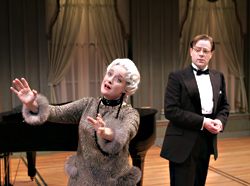Andy Warhol’s future is here. New technologies that allow simply anyone to broadcast their work around the world have created a cult of global celebrity, one that supplants timeworn standards of aesthetic quality with instant access and media penetration into every last nook and cranny of the known universe. Instead of Leonardo da Vinci and the Roman Catholic Church or Howard Hawks and the Hollywood studio system, we now have YouTube and Melvin Studge in the bathtub farting “Yankee Doodle Dandy.” With this great techno-egalitarian leveling of a formerly elitist playing field, anyone can be an artist, or at least famous, or at least make a spectacle of himself. Which raises questions: Is all art equal? Is my art better than your art? Is exposure a measure of talent? And who’s to judge?
Stephen Temperley’s two-person comedy Souvenir—now playing at ACT Theatre under the excellent direction of R. Hamilton Wright—is a hilarious, strangely heartbreaking meditation on Warhol’s 15-minutes-of-fame aphorism. Based on the stunning true story of Florence Foster Jenkins, a New York socialite who by sheer blind willpower ended up performing opera at Carnegie Hall despite an utter lack of talent, Temperley’s play is all the more timely for being set in the 1930s and ’40s; shorn of the bells and whistles of more up-to-the-minute satires, Souvenir gets at our sound-bite cyberculture only by the most indirect route and is that much more effective for it.
The play, in fact, is rather small-scale. Tony-nominated Broadway veteran Patti Cohenour plays Jenkins, the wealthy would-be diva with a voice like fingernails on slate. In the role of Cosme McMoon, Jenkins’ accompanist—and accomplice and enabler—is Mark Anders (whose recent credits include co-authorship of the Noël Coward revue A Marvelous Party). With just a piano between them, Anders and Cohenour create a delightfully complicated comic tension that recalls the era’s screwball comedies. Their relationship, utterly unromantic, is nonetheless fraught with desire, deception, and cross-purposes. In the weirdest way, they need each other. There is an oddball fatalism to the proceedings, a sense of inevitability to Jenkins’ brief and unlikely career. Most remarkably, considering the fiasco at hand, one comes to feel empathy for both characters.
Souvenir is narrated in flashback by McMoon, whose tone throughout is one of wonder and bafflement. “How could she not know?” he keeps asking of his tone-deaf pupil. He questions his own motivations too: “People ask, ‘Why did she do it?’ I think a better question is, ‘Why did I?'” Well, he needs the money, for one thing, but he also finds himself in thrall to her artistic drive, more than willing to ride her coattails to the top. In this way, Souvenir becomes much more than a story about blind ambition and the anatomy of a fiasco; by focusing equally on McMoon’s struggles of conscience, the play gives a more complete picture of how someone like Jenkins, a woman “so absolutely transparently sure of herself,” can become a world-class celebrity.
Cohenour is fantastic in the lead role. Of all the entitlements of the rich, perhaps the most offensive is their belief in their own good taste, yet Cohenour somehow makes charming Jenkins’ lack of doubt. When she first opens her mouth to sing (Cohenour actually has a lovely voice), what comes out is shocking: an explosive, flatulent, screeching, warbling approximation of good opera. It takes talent to sing that poorly that well—to imitate a person with no gift who thinks she has a gift. There is a kind of grandeur to Jenkins’ lack of self-awareness, and it’s difficult not to get wrapped up in the character’s ambition to make herself heard. And, ironically, her work ethic is top-notch; she is disciplined, hard-working, and eager to learn. The problem is she simply can’t hear the truth. As McMoon puts it, “What the audience heard was one thing; what she heard was something else.” As Jenkins’ grudging accompanist, tangled up and full of self-doubt, Anders is the perfect foil to her single-mindedness.
Souvenir is a strong, and very funny, antidote to our culture of celebrity-for-celebrity’s-sake, with its Anna Nicole Smiths and Paris Hiltons, Survivors and Biggest Losers. The play levels its gentle indictment not at those who achieve unwarranted fame but at those who allow it—the handlers, agents, and most significantly, the audiences who applaud the slapstick fumblings of fools and freaks. In the end, Jenkins gets just as much notoriety as the world is willing to give, and then she disappears. McMoon’s words as he looks back on the phenomenon he helped create seem to speak to a whole universe of limelight stealers: “Whether she was incredibly resilient or just plain crazy, I can’t say.” Amen.









